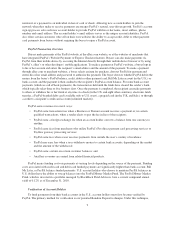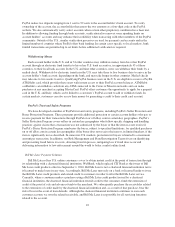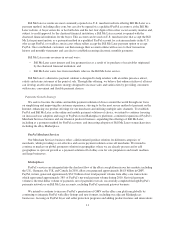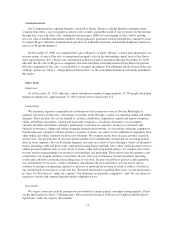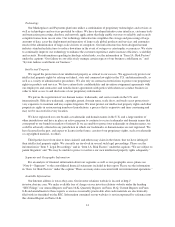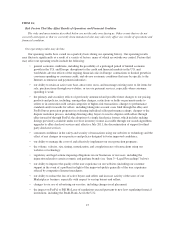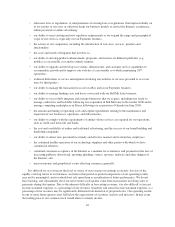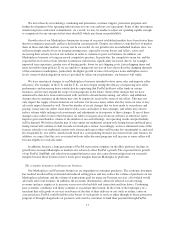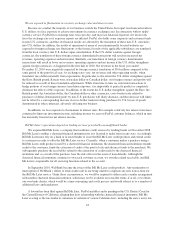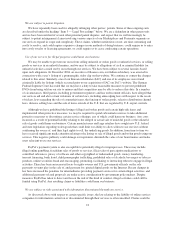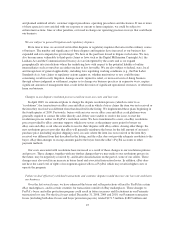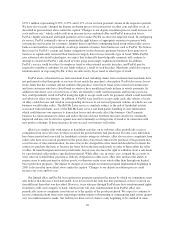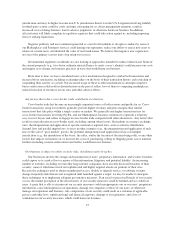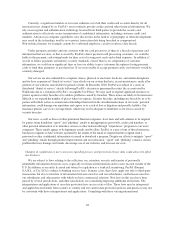eBay 2010 Annual Report Download - page 23
Download and view the complete annual report
Please find page 23 of the 2010 eBay annual report below. You can navigate through the pages in the report by either clicking on the pages listed below, or by using the keyword search tool below to find specific information within the annual report.We are exposed to fluctuations in currency exchange rates and interest rates.
Because we conduct the majority of our business outside the United States but report our financial results in
U.S. dollars, we face exposure to adverse movements in currency exchange rates. In connection with its multi-
currency service, PayPal fixes exchange rates twice per day, and may face financial exposure if it incorrectly
fixes the exchange rate or if exposure reports are delayed. PayPal also holds some corporate and customer funds
in non-U.S. currencies, and thus its financial results are affected by the translation of these non-U.S. currencies
into U.S. dollars. In addition, the results of operations of many of our internationally focused websites are
exposed to foreign exchange rate fluctuations as the financial results of the applicable subsidiaries are translated
from the local currency into U.S. dollars upon consolidation. If the U.S. dollar weakens against foreign
currencies, the translation of these foreign currency denominated transactions will result in increased net
revenues, operating expenses and net income. Similarly, our translation of foreign currency denominated
transactions will result in lower net revenues, operating expenses and net income if the U.S. dollar strengthens
against foreign currencies, as happened in the first half of 2010. Net revenues in the fiscal year ended
December 31, 2010 were negatively impacted by foreign currency translation of $9.6 million compared to the
same period of the prior fiscal year. As exchange rates vary, net revenues and other operating results, when
translated, may differ materially from expectations. In particular, to the extent the U.S. dollar strengthens against
the Euro, British pound, Korean won, Australian dollar or Canadian dollar, our foreign revenues and profits will
be reduced as a result of these translation adjustments. While from time to time we enter into transactions to
hedge portions of our foreign currency translation exposure, it is impossible to perfectly predict or completely
eliminate the effects of this exposure. In addition, to the extent the U.S. dollar strengthens against the Euro, the
British pound, the Australian dollar, the Canadian dollar or other currencies, cross-border trade related to
purchases of dollar-denominated goods by non-U.S. purchasers will likely decrease, and that decrease will likely
not be offset by a corresponding increase in cross-border trade involving purchases by U.S. buyers of goods
denominated in other currencies, adversely affecting our business.
In addition, we face exposure to fluctuations in interest rates. For example, relatively low interest rates have
continued to limit our investment income, including income we earn on PayPal customer balances, which in turn
has materially lowered our net interest income.
Bill Me Later’s operations depend on lending services provided by an unaffiliated lender.
We acquired Bill Me Later, a company that facilitates credit services by lending banks, in November 2008.
Bill Me Later is neither a chartered financial institution nor is it licensed to make loans in any state. Accordingly,
Bill Me Later must rely on a bank or licensed lender to issue the Bill Me Later credit products and extend credit
to customers in order to offer the Bill Me Later service. Currently, when a consumer makes a purchase using a
Bill Me Later credit product issued by a chartered financial institution, the chartered financial institution extends
credit to the consumer, funds the extension of credit at the point of sale and advances funds to the merchant. We
subsequently purchase the receivables related to the extensions of credit made by the chartered financial
institution and, as a result of the purchase, bear the risk of loss in the event of loan defaults. Although the
chartered financial institution continues to own each customer account, we own the related receivable, and Bill
Me Later is responsible for all servicing functions related to the account.
In September 2010, WebBank became the issuer of the Bill Me Later credit products. Any termination or
interruption of WebBank’s ability to lend could result in our being unable to originate any new transactions for
the Bill Me Later service. Under those circumstances, we would be required to either reach a similar arrangement
with another chartered financial institution, which may not be available on favorable terms, if at all, or to obtain
our own bank charter, which would be a time-consuming and costly process and would subject us to a number of
additional laws and regulations.
A lawsuit has been filed against Bill Me Later, PayPal and eBay and is pending in the U.S. District Court for
the Central District of California, alleging that in its relationship with the chartered financial institution, Bill Me
Later is acting as the true lender to customers in violation of various California laws, including the state’s usury law.
18



